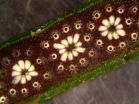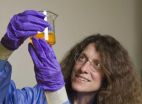(Press-News.org) (Santa Barbara, Calif.) –– Studies of the small sea squirt may ultimately help solve the problem of rejection of organ and bone marrow transplants in humans, according to scientists at UC Santa Barbara.
An average of 20 registered patients die every day waiting for transplants, due to the shortage of matching donor organs. More than 110,000 people are currently waiting for organ transplants in the U.S. alone. Currently, only one in 20,000 donors are a match for a patient waiting for a transplant.
These grim statistics drive scientists like Anthony W. De Tomaso, assistant professor of biology at UCSB, to delve into the cellular biology of immune responses. His studies of the sea squirt shed light on the complicated issue of organ rejection. The latest results are published online today in the journal Immunity.
De Tomaso hopes to understand how it might be possible to "tune" the body's immune response in order to dial down the rejection of a donated organ. Studying cellular responses in simple organisms may also eventually help with autoimmune diseases –– those in which the body mistakenly attacks itself.
"Right now, when you get a transplant, you're usually on immunosuppressives your whole life," said De Tomaso. "And that's like sort of kicking your immune system in the teeth. What if we could raise the threshold of when you would respond, instead of just shutting the whole system off?"
De Tomaso and his research team study Botryllus schlosseri, a type of sea squirt. This small organism –– known as a tunicate because of its covering, or "tunic" –– is a modern day descendant of the vertebrate ancestor, the group to which we belong. Tunicates begin life as swimming tadpoles with primitive backbones, nerves, and musculature that are similar to all vertebrates, but soon transform into stationary creatures. Tunicates latch onto intertidal surfaces and look like flat flowers –– with each "petal" being a separate, but genetically identical, body.
De Tomaso focuses on what happens when one sea squirt lands next to another. In this case, cells in the sea squirt's fingerlike edges, or "ampullae," recognize the neighboring sea squirt as "self" or "non-self." When the other sea squirt is related, then the two colonies fuse; otherwise, they reject each other. De Tomaso was involved in identifying the gene controlling the choice between fusion and rejection in the sea squirt when he was a postdoctoral fellow at Stanford University
In his current research, De Tomaso studies how the signals on the surface of the sea squirt's cells get translated inside the circuitry of the cell, where the final decision about acceptance or rejection is made. "In the case of Botryllus, what we found is that we have the same kind of integration that goes on in humans, but instead of having a multiple, very complex set of inputs coming in, we only have two," said DeTomaso. "We have also found that we can manipulate each one independently, so we know that somehow they are put together and the two inputs are integrated, and a decision is made about how to respond."
De Tomaso explained that he decided to work on Botryllus because it has a unique way to answer a very complicated question. He hopes to understand the process of rejection or acceptance. "If we could manipulate that process," said Tomaso, "then we could basically teach the immune system to simply ignore certain things. We could say, 'Just don't respond to this. We're going to transfer this bone marrow, just don't kill this bone marrow.' Bone marrow could get in and start making new blood, and it would be fine. To me, that's the most exciting thing long-term for the work."
INFORMATION:
Tanya R. McKitrick is the first author on the paper. She works in De Tomaso's lab at UCSB and also at Stanford University. Other co-authors are Christina C. Muscat, Stanford University; James D. Pierce, UCSB; and Deepta Bhattacharya, Washington University School of Medicine.
Note to Editors: Anthony De Tomaso can be reached at (805) 893-7276, or by e-mail at detomaso@lifesci.ucsb.edu. Downloadable photos are available at http://www.ia.ucsb.edu/pa/display.aspx?pkey=2463#description.
Studies of marine animals aim to help prevent rejection of transplanted organs
2011-04-15
ELSE PRESS RELEASES FROM THIS DATE:
Older workers benefit from high-tech, high-touch health promotion
2011-04-15
Older workers benefit most from a modest health behavior program when it combines a web-based risk assessment with personal coaching.
University of Illinois at Chicago researchers conducted a randomized trial to evaluate two worksite wellness interventions assessing older workers' health behaviors and outcomes. The findings are available online and will be published in an upcoming issue of the American Journal of Public Health.
The health behaviors that were examined were physical activity, diet, stress reduction and smoking cessation, says Susan Hughes, professor of ...
Novel therapy improves immune function in teen with rare disease
2011-04-15
In a novel approach that works around the gene defect in Wiskott-Aldrich syndrome, an inherited immune deficiency disorder, researchers used an alternative cell signaling pathway to significantly improve immune function in a 13-year-old boy with the disease. The study, at The Children's Hospital of Philadelphia, provides a proof-of-principle that immunotherapy, which harnesses elements of the body's immune system, may be used to treat this rare but often deadly disorder.
"If this encouraging initial result holds up in further ...
Inability to detect sarcasm, lies may be early sign of dementia, UCSF study shows
2011-04-15
By asking a group of older adults to analyze videos of other people conversing -- some talking truthfully, some insincerely -- a group of scientists at the University of California, San Francisco has determined which areas of the brain govern a person's ability to detect sarcasm and lies.
Some of the adults in the group were healthy, but many of the test subjects had neurodegenerative diseases that cause certain parts of the brain to deteriorate. The UCSF team mapped their brains using magnetic resonance imaging, MRI, which showed associations between the deteriorations ...
Recipe for radioactive compounds aids nuclear waste and fuel storage pools studies
2011-04-15
ALBUQUERQUE, N.M. — Easy-to-follow recipes for radioactive compounds like those found in nuclear fuel storage pools, liquid waste containment areas and other contaminated aqueous environments have been developed by researchers at Sandia National Laboratories.
"The need to understand the chemistry of these compounds has never been more urgent, and these recipes facilitate their study," principal investigator May Nyman said of her group's success in encouraging significant amounts of relevant compounds to self-assemble.
The trick to the recipes is choosing the right templates. ...
Hydrocarbons in the deep earth
2011-04-15
LIVERMORE, Calif. -- A new computational study published in the Proceedings of the National Academy of Sciences reveals how hydrocarbons may be formed from methane in deep Earth at extreme pressures and temperatures.
The thermodynamic and kinetic properties of hydrocarbons at high pressures and temperature are important for understanding carbon reservoirs and fluxes in Earth.
The work provides a basis for understanding experiments that demonstrated polymerization of methane to form high hydrocarbons and earlier methane forming reactions under pressure.
Hydrocarbons ...
Caltech researchers use GPS data to model effects of tidal loads on Earth's surface
2011-04-15
PASADENA, Calif.—For many people, Global Positioning System (GPS) satellite technology is little more than a high-tech version of a traditional paper map. Used in automobile navigation systems and smart phones, GPS helps folks find their way around a new neighborhood or locate a nearby restaurant. But GPS is doing much, much more for researchers at the California Institute of Technology (Caltech): it's helping them find their way to a more complete understanding of Earth's interior structure.
Up until now, the best way to explore Earth's internal structures—to measure ...
Warning to breastfeeding mothers
2011-04-15
Los Angeles, CA (April 7, 2011) While breastfeeding babies has numerous health advantages to both mother and child, mothers who breastfeed may find that other people look down on them and do not want to work with them. A recent study released by Personality and Social Psychology Bulletin (published by SAGE) found that mothers who breastfeed are viewed as less competent than other women.
Researchers conducted three varying double blind studies to determine the views of others towards breastfeeding moms. One study, for example, asked participants to measure the competence, ...
People know when first impressions are accurate
2011-04-15
First impressions are important, and they usually contain a healthy dose both of accuracy and misperception. But do people know when their first impressions are correct? They do reasonably well, according to a study in the current Social Psychological and Personality Science (published by SAGE).
Researchers had two separate groups of more than100 people meet in a "getting-acquainted" session much like speed-dating, until the people had spoken with everyone else in the group for three minutes each. At the end of each 3-minute chat, they rated each other's personalities, ...
Search for dark matters moves one step closer to detecting elusive particle
2011-04-15
Dark matter, the mysterious substance that may account for nearly 25 percent of the universe, has so far evaded direct observation. But researchers from UCLA, Columbia University and other institutions participating in the international XENON collaboration say they are now closer than ever before.
Their new results, announced today at the Gran Sasso National Laboratory in Italy, where the XENON experiment is housed deep beneath a mountain 70 miles west of Rome, represent the highest-sensitivity search for dark matter yet, with background noise 100 times lower than competing ...
Experimental drug inhibits cell signaling pathway and slows ovarian cancer growth
2011-04-15
An experimental drug that blocks two points of a crucial cancer cell signaling pathway inhibits the growth of ovarian cancer cells and significantly increases survival in an ovarian cancer mouse model, a study at UCLA's Jonsson Comprehensive Cancer Center has found.
The drug, called NVP-BEZ235, also inhibits growth of ovarian cancer cells that have become resistant to the conventional treatment with platinum chemotherapy, and helps to re-sensitize the cancer cells to the therapy. It also enhances the effect of platinum chemotherapy on ovarian cancer cells that are still ...



